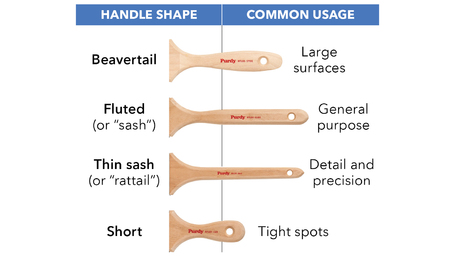*
I am thinking about putting Pergo type flooring in my basement. There aren’t any moisture problems that I can see and the present floor cover is what used to be refered to as asphalt tile. The tile is all tight can I go on top of it. Any actual hands on help type information would be much appreciated. How long can I expect this product to last. There will be traffic on it everyday.
Discussion Forum
Discussion Forum
Up Next
Video Shorts
Featured Story

Tips for picking the right paintbrush based on paint type, surface, and personal comfort.
Highlights
"I have learned so much thanks to the searchable articles on the FHB website. I can confidently say that I expect to be a life-long subscriber." - M.K.
Fine Homebuilding Magazine
- Home Group
- Antique Trader
- Arts & Crafts Homes
- Bank Note Reporter
- Cabin Life
- Cuisine at Home
- Fine Gardening
- Fine Woodworking
- Green Building Advisor
- Garden Gate
- Horticulture
- Keep Craft Alive
- Log Home Living
- Military Trader/Vehicles
- Numismatic News
- Numismaster
- Old Cars Weekly
- Old House Journal
- Period Homes
- Popular Woodworking
- Script
- ShopNotes
- Sports Collectors Digest
- Threads
- Timber Home Living
- Traditional Building
- Woodsmith
- World Coin News
- Writer's Digest


















Replies
*
You should be able to go on top of your old floor. You'll use a layer of PVC (Pergo sells it) first as a moisture barrier, followed by a layer of thin foam.
We used the "residential grade" Pergo in a store 2 years ago, and still have no scratches or any wear on it!
*Read and follow the directions very carefully. I heard of a guy who installed Pergo and overlapped the thin foam underlayment sheeting instead of butting it together as the directions tell. It's a small thing but translated into an obvious problem to anyone who walked over the floor. The homeowners were very unhappy. The only fix was to replace the whole thing. It wasn't just one room but the entire downstairs of a house. The installer wasn't about to replace it at his expense-- insisted that he had done it right. I don't know how it turned out.I've installed a few Pergo floors (one over concrete) and they went easy. Looked good too but not like real wood. If someone really wants the look of real wood, they will be disappointed in Pergo (and any other laminate floor). Here's a tip: Glue squeeze out can be a chore to clean up, but it's much easier if you just leave it there for a few minutes, until it hardens a little, then you can scrape the bulk of it off with a plastic putty knife.Have funH. Kimball
*I installed this for one customer who said that Pergo just didn't feel right on a bare feet. This may also feel colder in winter than wood. However, none of this comes from a personal experience. Check for moisture by duct taping a 1 foot square piece of plastic to the slab. If there is moisture on the plastic after overnight, you should consider further professional advice as well as some heavy duty moisture barrier. On moisture barrier, use tyvek tape to seal the joints and bring up the edge of the barrier against the wall and cover with molding later, ie, don't cut the barrier on the floor.
*
Sam, you use the phrase "Pergo type flooring." Are you planning to use Pergo, or some other laminate flooring?
You ask how long you can expect the product to last, but the answer may depend on which brand you are using.
I am curious as to which brands may not be as good as the Pergo.
Rich Beckman
*Make SURE to seal the basement floor with plastic. There are cheaper and probably better options than the Pergo stuff -- their prices for accessories are outrageous -- such as Tu-Tuff or an imported plastic (polyethylene?) I bought from Resource Conservation Technologies in Baltimore. RCT also sell a double-sided tape for making airtight seams.The problem with our basement is not so much moisture from the soil as condensation during the summer. The cool floor (what is the year-round underground temp -- about 55°?) and the humid air cause mold and other unfriendlies to grow. Of course real wood is generally not recommended for basements I've been using a dehumidifier and when I Pergo the floor I will put down some thin insulation board underlayment to keep the floor from getting so cool. The main point of the Pergo underlayment, incidentally, seems to be to prevent the boards from gettin glued to the floor. They make a big deal about the floor's need to expand and contract.Definitely rent the official clamps. They let you go faster and pull the boards together really tight, watertight and almost invisible. I found the stuff easy to work with, although it is really picky about the subfloor being flat -- they want no more than 1/8" variation in 10'. It's not cheap.
*
I am thinking about putting Pergo type flooring in my basement. There aren't any moisture problems that I can see and the present floor cover is what used to be refered to as asphalt tile. The tile is all tight can I go on top of it. Any actual hands on help type information would be much appreciated. How long can I expect this product to last. There will be traffic on it everyday.